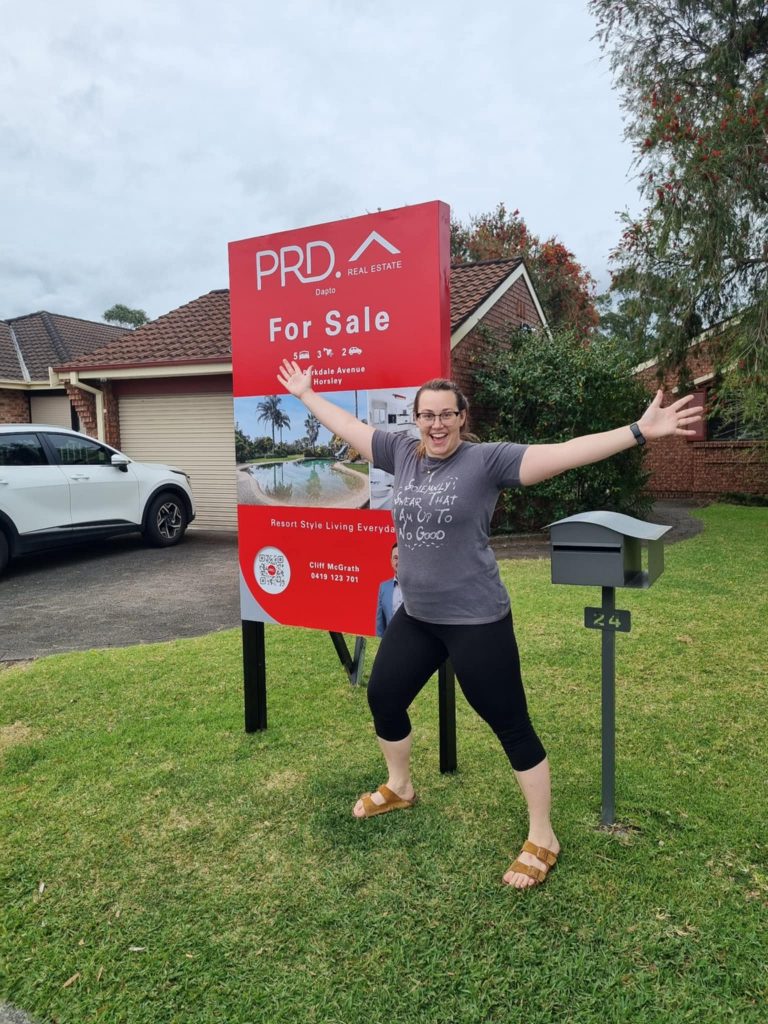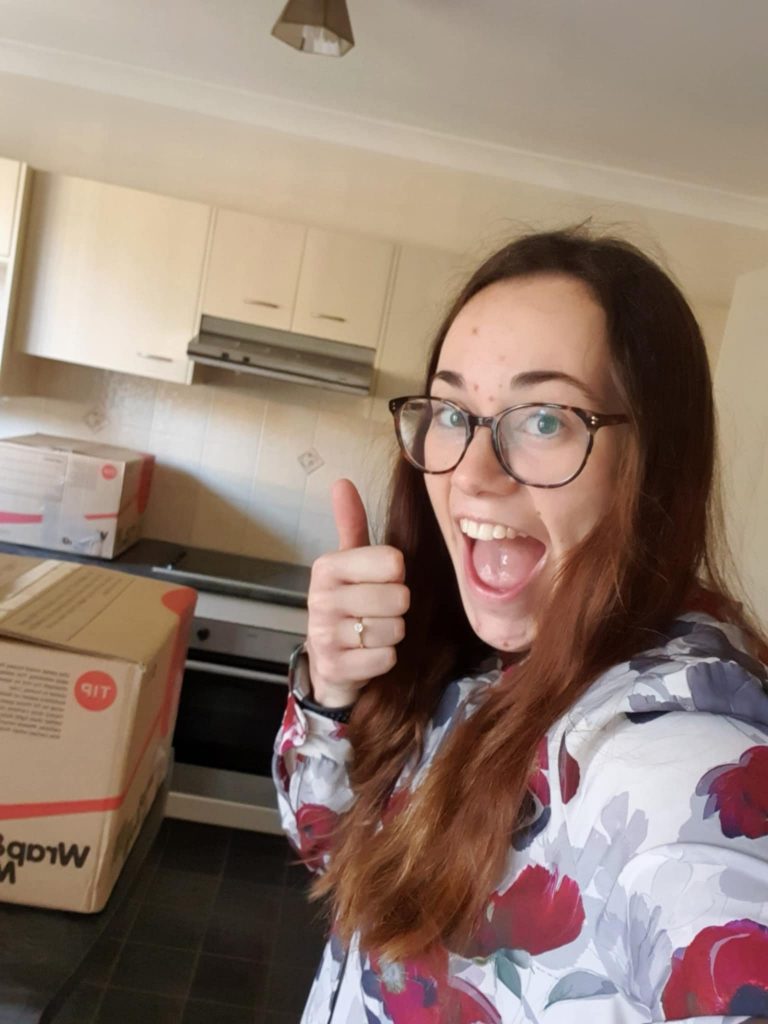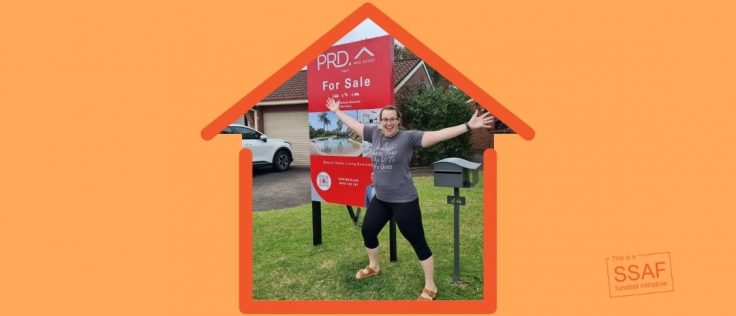Written by Ashleigh Epton
After three and a half years of completing my undergraduate degree and completing a semester abroad (taking an additional OS-HELP Loan), my HELP loan was really starting to rack up. I remember wondering how long it was going to take to pay off my loan, pay for a wedding, and even if I would ever be able to buy my own house.
Thankfully I was able to achieve both of these things, marrying my now husband in October 2020 and purchasing our first home in November later the same year.

You might be asking how this was possible with such a big HECS debt? You might also be interested in how you can do the same. I’m here to help!
How Your HECS Debt Impacts Your Borrowing Ability
First things first – you probably want to know how your HECS debt impacts your borrowing ability.
According to RealEstate.com, HECS debts don’t generally impact your credit score, however they are taken into consideration by banks when considering how you will make repayments. So, how do you demonstrate you will be able to make repayments? One of the best ways is to demonstrate you can make your rent and bill payments on time. Secondly, it’s to figure out how much “spending” money you have.
One of the first things my now husband and I did was to run through our finances to determine what our “spending” amount was. This was the free money after all our bills, rent and rates were accounted for. Secondly, we wanted to prioritise still having fun and prioritising time with each other, so some “additional necessities” included spending money for one night out per week, two subscription services, and some miscellaneous money for one-off events like weddings, birthdays and Christmas.
This was all done using net income, so the money was actually in our bank accounts. We followed the Barefoot Investor’s (Scott Pape) method to paying off all credit accounts, and proceeded to close them when credit was paid down (best $20 I ever spent). This also shows the banks that you have the ability to pay off debt (a big bonus for you!). This was an integral part of the process, and I think it’s what really set all the wheels in motion for us.
How is Buying a House Even Possible?

Secondly, is how buying a house is even possible?
I have to be upfront with you – yes, it is possible, but it’s not easy – like most good things in life. The Barefoot Investor refers to HECS debt, and essentially advises that it will pay itself off over time, so you do not need to actively pay it down; instead, use any excess money to put into your deposit for a home to reach your goals sooner.
Also, investigate first homeowner grants! You need to apply for this – it is not automatic. It is my personal preference to not have to pay Lenders Mortgage Insurance (LMI), as this is just an additional cost to you, so realistically you want to have saved 20% of the cost of the home.
Practical Tips to Help You Save
Lastly, you probably want some practical tips to help you to save.
As stated above, you need to understand your finances – pay attention to where your money is going and make adjustments as necessary. We put a practical cap on how much we could spend on coffee per week ($50 in case you needed to know), so we knew we couldn’t exceed this. We still put money aside to do things together – the banks also look at how you live, so you shouldn’t stop doing everything that brings you joy in order to build up a higher deposit.
This is not practical in the long run, as you will still need to manage your money when you buy your home. Any excess money that was not spent rolled over, so rather than four little things, some months my partner and I did just the one big thing (i.e. big splurge at a steakhouse). We also reassessed how often we were eating out. Early in our relationship, we went out for dinner or got takeaway 4-6 times a week. This was convenient because we were time poor as entry-level professionals trying to make a dint in our careers. However, it ended up saving us around $200 or more a week to cook at home.
We did grocery shopping on the Woollies app and just added things throughout the weeks to our grocery list as things came up around the house, committing to picking up our shopping as a click and collect on Sundays. We also changed our habits to reduce our spending on activities (i.e. taking up hiking, crocheting, picnics, playing Pokemon Go, video games, etc).

Additional considerations
When we were close to reaching our deposit goal, we made an appointment to meet with the bank and start the ball rolling on our pre-approval. Pre-approval is not required for the process of purchasing a home, however we felt it was important.
Most real estate agents (from my experience) expect that you will have pre-approval prior to putting an offer on a home. The reason behind this is pre-approval states exactly how much the bank is willing to loan you so its not ambiguous and you don’t over commit. A lot of people I know who have skipped this step have been shocked when their loan application has been denied (leading them to miss out on buying the home they wanted) or surprised they were not able to borrow as much as they initially thought they would be able to.
An additional consideration for my partner and I was where we were going to live and what kind of life we wanted. We did not want to live in the city, so we looked in surrounding suburbs that had lots of parks for our growing family. When we found a few suburbs that were suitable we did a LOT of research on the surrounding house market. We looked at median prices for houses, townhouses and villas, as well as strata costs and council rates (you can, and should, request this information from agents at open homes if the information is not stated). We had a really clear idea of how much we would need to spend for 2, 3 and 4 bedroom homes in the suburbs we were looking at. We were also looking at recent sales by different agencies and could determine which were overpriced.
You may additionally wish to go with a mortgage broker (we didn’t) and get a solicitor to look over your contracts before signing (we did!).
My number one piece of advice for anyone looking to get into the housing market it to educate yourself. You are better able to advocate for yourself if you understand your commitments, and you are in a better position to purchase a home if you understand how the process works. Unfortunately there are many real estate agents out there that don’t have your best interests in mind, so you need to arm yourself.
Happy shopping!

Additional information for you:
- Repaying your HECS loan – StudyAssist.com
- Mortgage Choice – How HECS affects your home loan
- Getting Pre-Approval – NSW Government
Charlie blog is a SSAF funded initiative










